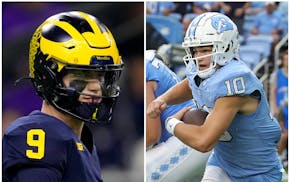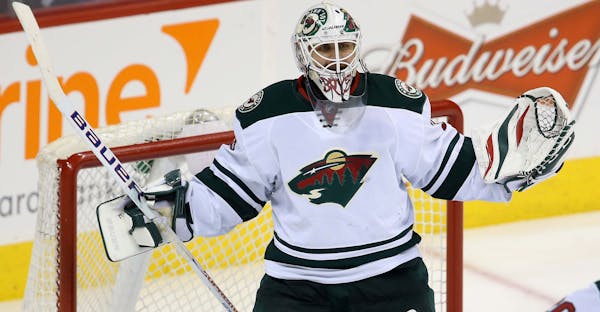DENVER – If playoff seedings matter, the Wild technically begins its first-round series against the Colorado Avalanche as an underdog.
If common sense is applied, the Wild absolutely has a good chance to win the series and advance to the next round.
Why? Because success in the NHL playoffs often is determined by matchups, a team's health, its frame of mind and a peculiar thing called puck luck. A team's seeding sometimes becomes irrelevant.
The Wild enters as the No. 7 seed and confident in its circumstance. The Wild earned the No. 8 seed last season and had little chance of defeating Chicago in a best-of-seven series.
That's a difference of only one seeding slot. In reality, those two situations feel a universe apart.
"We're right where we want to be," Wild captain Mikko Koivu said.
The Wild found itself in the exact opposite spot last season. The team coughed and wheezed to the finish line, finally securing a playoff berth on the final day of the regular season.
That team wasn't primed for the playoffs, and certainly not equipped to handle the mighty Blackhawks. The Wild was beat up physically, fragile mentally and limped into the postseason. Seeding mattered that time, though it's hard to imagine the Wild having success against any team in that condition.
The Wild now faces a Colorado team that produced the NHL's third-best record and is blessed with top-end skill. The Avs won four of their five meetings this season and are a formidable opponent, but they don't seem invincible in the way Chicago did. That's because the Wild arrives from a different direction this time.
The team's playoff push resembled a crescendo rather than a death march. The Wild played inspired, desperate hockey the final two weeks to build the kind of momentum that creates optimism and a belief that this team isn't just happy to be here. The team didn't back into anything.
The Wild is remarkably healthy and confident its defensive system and structure can lead to playoff success if executed. The roster has more proven scorers. If goalie Ilya Bryzgalov continues his save-the-day act and doesn't crumble under playoff pressure, the Wild can win this series and it won't feel as if something fluky just happened.
"Obviously you earn what you get in the regular season," Koivu said. "But when the puck hits the ice [in the playoffs], you never know what's going to happen, in one game or even in one series."
Momentum cannot be overstated in playoff hockey. It's a great equalizer, something that happens all the time. A team gets hot, a goalie steals a game, pressure on the favorite mounts and voilà, an upset occurs. Except the term upset is relative in playoff hockey.
That's what makes the NHL postseason so tense and compelling. A No. 1 vs. No. 8 matchup isn't a gimme.
The Los Angeles Kings won the Stanley Cup as a No. 8 seed in 2012. They beat the sixth-seeded New Jersey Devils in the finals.
Philadelphia made the Cup finals in 2010 as a seventh seed. Edmonton did the same thing as the No. 8 seed in 2006. Anaheim lost in the finals as the seventh seed in '03.
Remember that year? A scrappy bunch of sixth-seeded overachievers from St. Paul upset the Avalanche in the first round, a team that by most measures appeared vastly superior.
"Just the way you feel mentally about your game, that's the most important thing, regardless of what seed you are," said Zach Parise, captain of that New Jersey Devils team in 2012. "The home ice is nice, don't get me wrong. But you've got to win on the road anyway so it's more so about how you feel about your own game."
The Wild should feel good about itself as the postseason begins. And getting here isn't satisfying enough. It seems defeatist to suggest that just making this series competitive will represent progress.
This is not last year. The Wild is good enough to win and advance. This team played as well as anyone down the stretch.
Yes, the Wild opens on the road as a No. 7 seed. So what? That only matters if they allow it.
Chip Scoggins • chip.scoggins@startribune.com

Scoggins: Finch feeling heat of the Suns as playoff battle looms
Scoggins: Why 'championship or bust' fits these Wolves

Scoggins: Anatomy of a game-saving play as Correa throws out Ohtani


